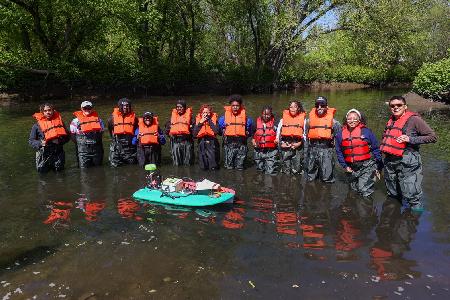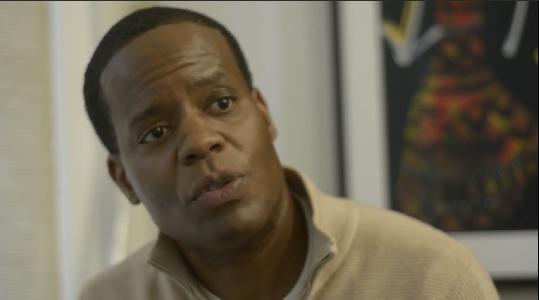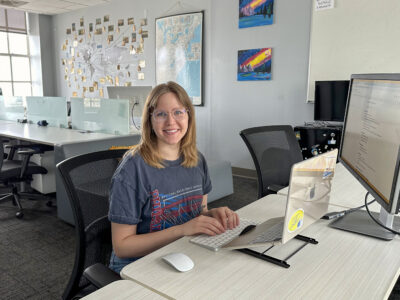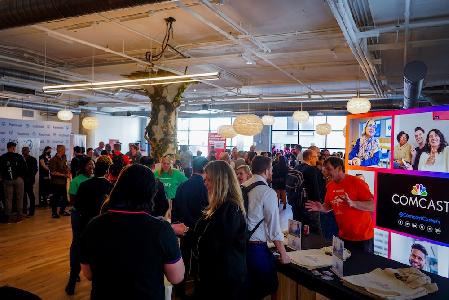With six men and four women, the technology team at design agency Think Brownstone has a nearly even gender breakdown.
But a 1:1 to male to female ratio was never an objective, said Kimberly Blessing, who heads the tech team at the Conshohocken-based design agency. It was an outcome.
Blessing, 38, a Northern Liberties resident who has worked at Paypal, Comcast Interactive Media and Weblinc, stresses diversity in her recruiting efforts, but diversity comes in many forms, she said. Above all, she stresses diversity when it comes to personality and behavior traits.
So, she never sought out women developers just for the sake of diversity. But, Blessing said, there are certain things about her recruiting and management strategy that might have inclined more women to join her team.
Below, Blessing talks to us about the first tech team she ever managed, fighting for web developers at AOL and how honesty can help you build a more diverse team.

Think Brownstone’s tech team.
Edited for length and clarity.
From a gender standpoint, your team is pretty diverse. Do you do anything differently when it comes to recruiting?
Nothing about the process itself is different. But the biggest difference is that I’m the head of all our technology services. That, right away, sends a different message to our prospective employees.
My philosophy when it comes to tech management is a little different: I emphasize failure. It’s because I’ve made so many mistakes myself. So I think I make it very safe [to fail]. If we’re not making mistakes, that means we’re not trying new things. And I don’t want us to be stuck in a rut. I emphasize that before I actually talk about the work.
Tell us more about your philosophy when it comes to running a tech team.
Honesty is really important. Building trust with people is how you build a strong team. There should be a culture of trust, where people feel comfortable speaking up if, for example, someone hurt their feelings.
Here’s an example of that: At one of my first jobs out of school, when I realized I was being paid less than others (men and women) on the team with comparable experience, I didn’t know how to bring it up to my boss. But I had a good relationship with him, so I trusted that I could bring it up — instead of sitting at my desk, festering, angry that I wasn’t getting paid enough.
Do you think it’s important to have a diverse team?
I think diversity is incredibly important. Our clients themselves are diverse. But diversity can be cultural, racial, behavioral. You can have a group of women and you’ll find that they’re diverse. You’re going to encounter diversity whether you intend to or not, and the more that you welcome it the better off you are.
I think it’s important to build a team that’s diverse when it comes to strengths and weaknesses. I’ve been using Gallup‘s StrengthsFinder since 2006. It’s a book and behavioral tool that shows you your top five strengths. I have everybody who I work with take it.
What about racial diversity? Are there different challenges associated with building a team in that respect?
It is something that I think about. I think that some of the biggest challenges about being in the Philadelphia area is that when we’re looking at the college-educated crowd, we have a very diverse population — racially, ethnically, socioeconomically — but not everyone wants to stick around. And most people don’t want to hire a junior person. They want to hire someone who knows how to do this work already. So I think there’s an opportunity for Philadelphia companies to create internships and fellowships to help students get the experience they need to get hired. And I think thats how we end up keeping folks.
It is typically the people from a middle class background who are comfortable freelancing until they make it. That’s a struggle when the middle class is not racially diverse.
A lot of us got into the web 20 years ago with no college background, but that’s become a requirement in our field. We need to create more opportunities to get people who don’t choose that path into our field. We need to make more time to get involved with STEM programs.
I think the companies that make early attempts [to reach out to all kinds of candidates] and do actually demonstrate growth with respect to diversity are the ones that will continue to be diverse, simply because people coming in to interview will think, “Wow, there are other people here who look like me.”
How long have you been in tech management?
I’ve been in tech management since 2004. But I was also Bryn Mawr College‘s first webmaster. When brynmawr.edu first launched [in the mid-90s], I told school administration that they needed a nicer website. So they paid me to run the site. By the time I left, there was a whole team of students [that I managed] building websites.
Can you tell us about an early experience that helped you get into a management role?
I worked at AOL in Dulles, Va. shortly after college, when AOL was a leader in its field and everyone used dial-up. There, I didn’t see a great deal of respect for web developers. Of course, I was really young at the time, so I made those assumptions because that was what I saw.
So I came to my boss and told him what I noticed and how we should change it. He took my suggestions, and then they were like, “We need someone to manage this team, this monster we’ve created,” and I said, “That should be me.” It was a team of about 40 developers. I was 28 at the time.
Join the conversation!
Find news, events, jobs and people who share your interests on Technical.ly's open community Slack

Philly daily roundup: Technical.ly's new editor; Meet Diversitech's founder; Flaws in planned TikTok ban

Edtech CEO looks back on the promises of summer 2020: 'It never rang true to me'

Technical.ly boosts editorial team with hire of experienced tech journalist

